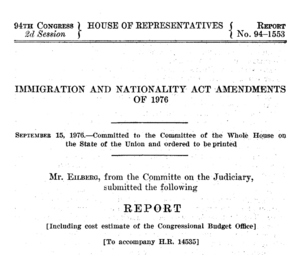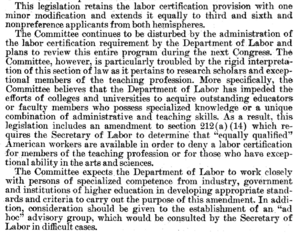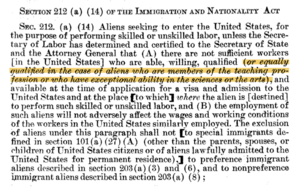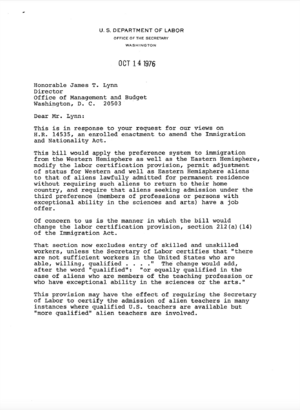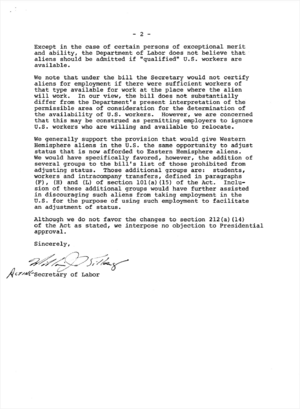Eilberg Amendment (1976)
The HR14535 Immigration and Nationality Act Amendments of 1976, otherwise known as the Eilberg Amendment to the Immigration and Nationality Act of 1952, sponsored by Rep. Joshua Eilberg (D) Pennsylvania and several others, while largely focused on family reunification and establishing a preference system for visa allocation, added several clauses that significantly impacted the employment-based immigration landscape. By setting quotas and priority dates, it influenced the availability of visas for high-skilled workers in the science and technology sectors.
The amendment's "special handling" provisions facilitated the hiring of foreign academics, potentially disadvantaging American researchers by allowing universities to prioritize foreign candidates. By allowing universities to prioritize marginally more qualified foreign candidates, the amendment contributed to wage suppression and reduced job opportunities for domestic talent. This policy also risked stifling innovation by incentivizing the hiring of less risky, potentially less innovative candidates, thereby impacting the quality and creativity of U.S. research output.
Academic discussion of these effects remains nearly nonexistent; a Sloan Workshop Report from 2003 by Eric Weinstein is, to our knowledge, the only publicly available exploration of the topic.
Key Changes in the Amendment
The important changes the Eilberg Amendment made to the Immigration and Nationality Act (originally enacted in 1952) relevant to high-skilled immigration are quoted below. Square brackets indicate material removed by the amendment; italics indicate material added.
3) Visas shall next be made available, in a number not to exceed 10 per centum of the number specified in section [201 (a) (ii)] 201 (a) (1) or (2), to qualified immigrants who are members of the professions, or who because of their exceptional ability in the sciences or the arts will substantially benefit prospectively the national economy, cultural interests, or welfare of the United States[.] and whose services in the professions, sciences, or arts are souqht by an employer in the United States.
(6) Visas shall next be made available, in a number not to exceed 10 per centum of the number specified in section [201 (a) (ii)] 201(a) (1) or (2), to qualified immigrants who are capable of performing specified skilled or unskilled labor not of a temporary or seasonal nature, for which a shortage of employment and willing persons exists in the United States.
SECTION 212 (a) (14) OF THE IMMIGRATION AND NATIONALITY ACT
SEC. 212. (a) (14) Aliens seeking to enter the United States, for the purpose of performing skilled or unskilled labor, unless the Secretary of Labor has determined and certified to the Secretary of State and the Attorney General that (A) there are not sufficient workers [in the United States] who are able, willing, qualified (or equally qualified in the case of aliens who are members of the teaching profession or who have exceptional ability in the sciences or the arts), and available at the time of application for a visa and admission to the United States and at the place [to which] where the alien is [destined] to perform such skilled or unskilled labor, and (B) the employment of such aliens will not adversely affect the wages and working conditions of the workers in the United States similarly employed. The exclusion of aliens under this paragraph shall not [to special immigrants defined in section 101(a) (27) (A) (other than the parents, spouses, or children of United States citizens or of aliens lawfully admitted to the United States for permanent residence),] to preference immigrant aliens described in section 203 (a) (3) and (6), and to nonpreference immigrant aliens described in section 203 (a) (8)
The "Special Handling" Process
The "special handling" process under the 1976 Eilberg Amendment referred to an expedited and preferential procedure for obtaining labor certification for certain categories of foreign professionals, particularly college and university teachers. The ostensible purpose was to address the specific needs of U.S. educational institutions and to facilitate the hiring of qualified foreign faculty members in cases where no qualified U.S. worker was available.
- Criteria for Eligibility: To qualify for special handling, the position had to be in the teaching field at a college or university. The employer was required to demonstrate that the foreign national was more qualified for the position than any U.S. worker who applied. This was often done through a comparative evaluation of the qualifications of all applicants, focusing on education, experience, and other relevant factors.
- Recruitment Requirements: The employer was still required to conduct a recruitment effort, but the standards were somewhat relaxed compared to the general labor certification process. The recruitment needed to demonstrate that the employer had advertised the position and considered all available U.S. applicants before offering it to the foreign national.
- Processing and Approval: The "special handling" provisions allowed for a more streamlined review process, acknowledging the unique circumstances of academic hiring. The Department of Labor recognized that academic appointments often required specialized expertise and a higher level of qualifications, which might not be readily available among U.S. workers.
- Impact on the Labor Market: While intended to facilitate the hiring of foreign talent, the process also faced criticism for potentially disadvantaging American researchers by allowing institutions to prioritize even marginally more qualified foreign candidates. This raised concerns about wage suppression, limited job opportunities for domestic talent, and a potential reduction in innovation if riskier, potentially more innovative researchers were overlooked in favor of safer candidates.
Eric's 2003 Sloan Workshop Report
The report "Issues of Legislation and Merit in Scientific Labor Markets," authored by Eric Weinstein, critically examines the Eilberg Amendment's impact on academic labor markets. It argues that the amendment allowed universities to bypass standard labor certification requirements, treating foreign academic hires with exceptional leniency compared to other sectors. The report highlights the unintended consequences of these policies, such as disadvantaging qualified American researchers by allowing universities to prefer marginally more qualified foreign candidates. This critique differs from the typical justification for these policies, which emphasizes the need for exceptional talent in academia.
The Sheepherder Provision
We now discuss the specific provisions added by the Eilberg amendment and the Immigration Act of 1990.
The Sheepherder Provision: Special Handling
It is a little known fact that in 1952 and 1954, congress was moved to declare a shortage of Basque Sheepherders in the western United States. Since that time, an employers association of ranchers (known as the 'Western Range Association') has enjoyed anomalous immigration privileges in recognition of the hardship posed by the alleged shortage conditions. This would be little more than a footnote to history except that in 1976, the Association of American Universities (AAU) succeeded in inserting (almost unnoticed) a parenthetical clause into Title 8 of the U.S. Code. This clause had the effect of removing the universities from the uniform labor certification requirements and placing them within the 'Special Handling' regulation reserved for immigrant shepherds.
The result of this switch was that Universities were granted unique privileges found nowhere else in the economy. For example, qualified American researchers are distinguished in that they alone can be technically reclassified (for purposes of labor certification) as 'unavailable for work' in the event that a university succeeds in portraying a foreign applicant as even marginally more qualified.
Curiously, in recent years the AAU has claimed that labor certification meaningfully protects American researchers from unfair university hiring practices. Publicly responding to charges that universities lower their labor costs by using special immigration exemptions, AAU president Cornelius Pings wrote:
"This is simply not true. ... in most cases where foreign scientists are hired using permanent work visas, universities and businesses are required to prepare detailed labor certifications, which need to be approved by the Department of Labor before an individual can be hired. These certifications must demonstrate that the person sought is being paid at or above the prevailing wage for the position." -Cornelius Pings, Letter to the Editor WSJ, Sept. 1996.
This is not easy to reconcile with private correspondence between the former AAU president and the sponsor of the 1976 Eilberg Amendment:
"...you have circumvented the primary rationale for denial of labor certification: that an unlimited supply of American manpower exists whose employment prospects are being usurped by alien labor." -John Osvald, AAU President, Letter to Joshua Eilberg, Nov. 1975.
The Shortage Provision
The Shortage Provision: "Schedule A"
While a sustained labor shortage may be nothing more than market pressure on employers to improve wages and working conditions, short term labor shortages can occur in skilled occupations for the duration of the time needed to train new workers. These temporary shortages could conceivably last several years in fields requiring extensive training.
Recognizing the legitimate needs of employers who on rare occasions may face such emergencies, the United States maintains a (very) short list of occupations experiencing labor shortages; this list is known as the 'Schedule A' list of shortage occupations.
Despite the unusual levels of unemployment and underemployment which currently affect young researchers, colleges and university employers have been listed on Schedule A as suffering from shortages of "college and university teachers of exceptional ability" for the last 20 years following the passage of the Eilberg amendment in 1976-77. Even more surprising is that under the provisions of 'Eilberg', colleges and universities are apparently mandated at the level of regulation to be listed as shortage afflicted in perpetuity and without regard to future labor market conditions.
On X
Eric has mentioned the Eilberg Amendment numerous times on X:
On Youtube
Eric mentioned the Eilberg Amendment in a conversation about academia with Brian Keating:
We have to stop this.... This is not a thousand-year-old tradition; this has to do with Vannevar Bush, the Endless Frontier, the expansion of the post-secondary education system. You know, I was hanging out with the provost at the UCSD and he didn't even understand the effect of the Eilberg Amendment of 1976, Bayh-Dole in 1980, the fraudulent NSF and NAS projections of a looming shortage that opened the floodgates of foreign labor inside universities; its misclassification as student apprenticeship, there's an entire recent horrible history of turning the modern Professor into a serf, not just the graduates student into a serf, but attempt to destroy academic freedom. If you cannot tell people to screw off and know that you are still funded the next day, and you can still come into your office, the field is lost.
- Eric Weinstein on Brian Keating's podcast on May 19, 2020
Additional Criticism
Archived communication between the then acting Secretary of Labor and James T Lynn, then Director of the Office of Management and Budget, puts forward concerns expressed by the Secretary of Labor at the time that the amendment was being considered:
Of concern to us is the manner in which the bill would change the labor certification provision, section 212(a) (14) of the Immigration Act.
That section now excludes entry of skilled and unskilled workers, unless the Secretary of Labor certifies that "there are not sufficient workers in the United States who are able, willing, qualified ..." The change would add, after the word "qualified": "or equally qualified in the case of aliens who are members of the teaching profession or who have exceptional ability in the sciences or the arts."
This provision may have the effect of requiring the Secretary of Labor to certify the admission of alien teachers in many instances where qualified U.S. teachers are available but "more qualified" alien teachers are involved.
Except in the case of certain persons of exceptional merit and ability, the Department of Labor does not believe that aliens should be admitted if "qualified" U.S. workers are available.
We note that under the bill the Secretary would not certify aliens for employment if there were sufficient workers of that type available for work at the place where the alien will work. In our view, the bill does not substantially differ from the Department's present interpretation of the permissible area of consideration for the determination of the availability of US workers. However, we are concerned that this may be construed as permitting employers to ignore U.S. workers who are willing and available to relocate.
This concern foreshadows the criticism Eric puts forward in his analysis, but does not seem to have been addressed before the amendment was passed.
Emphases in bold in the quoted paragraph above are ours.
References
- HR14535 Immigration and Nationality Act Amendments of 1976
- Issues of Legislation and Merit in Scientific Labor Markets
See Also
- The Evolution of U.S. Science and Defense Research Policies
- Bayh-Dole Act (1980)
- Embedded Growth Obligations
- IMMACT90
- Macropaternalism
- Mansfield Amendment (1969)
- Peer Review
- Science, The Endless Frontier (1945)
- Science Since Babylon
- The Idealism of Every Era Is the Cover Story of Its Greatest Theft
- Universal Institutional Betrayal

